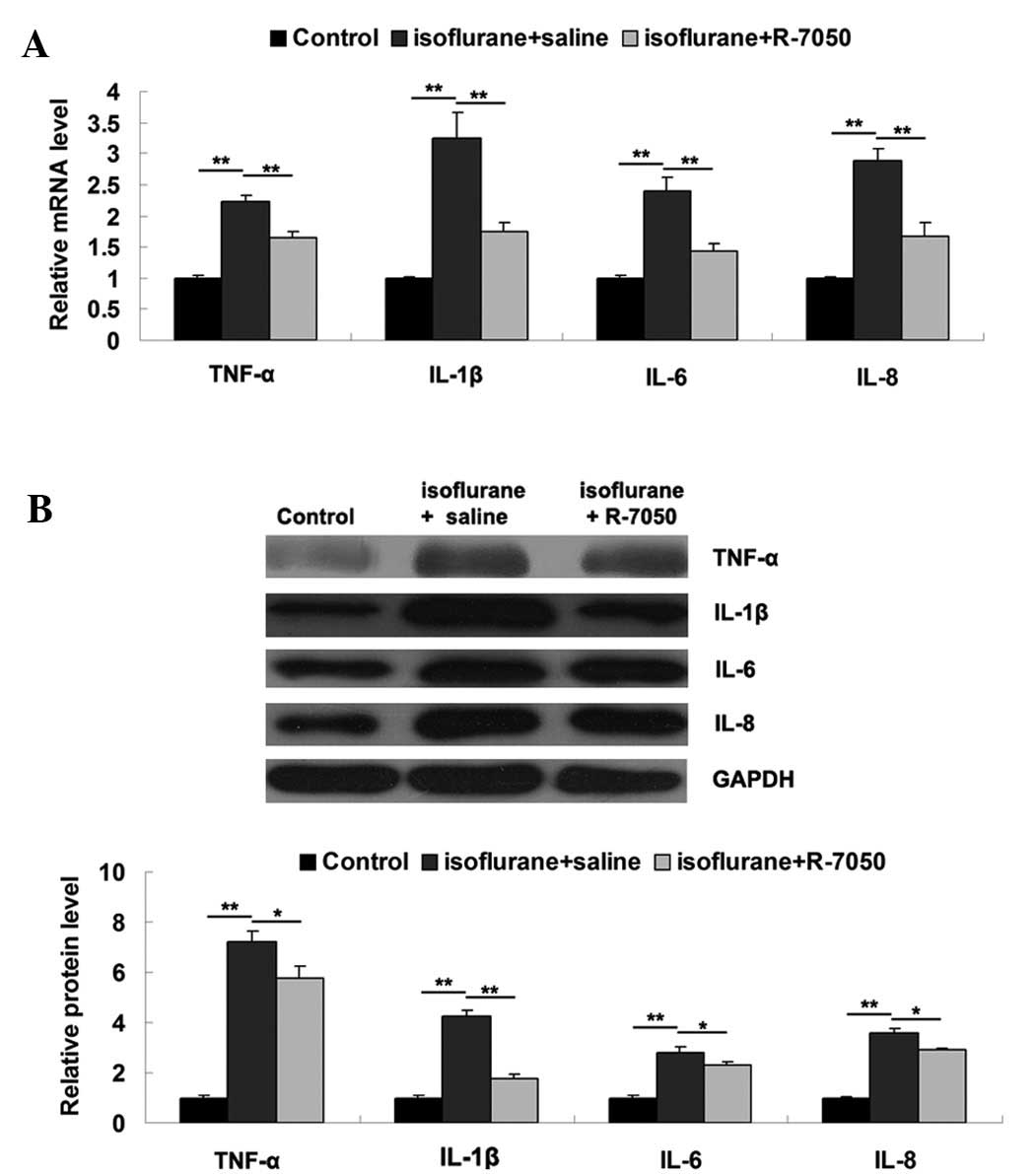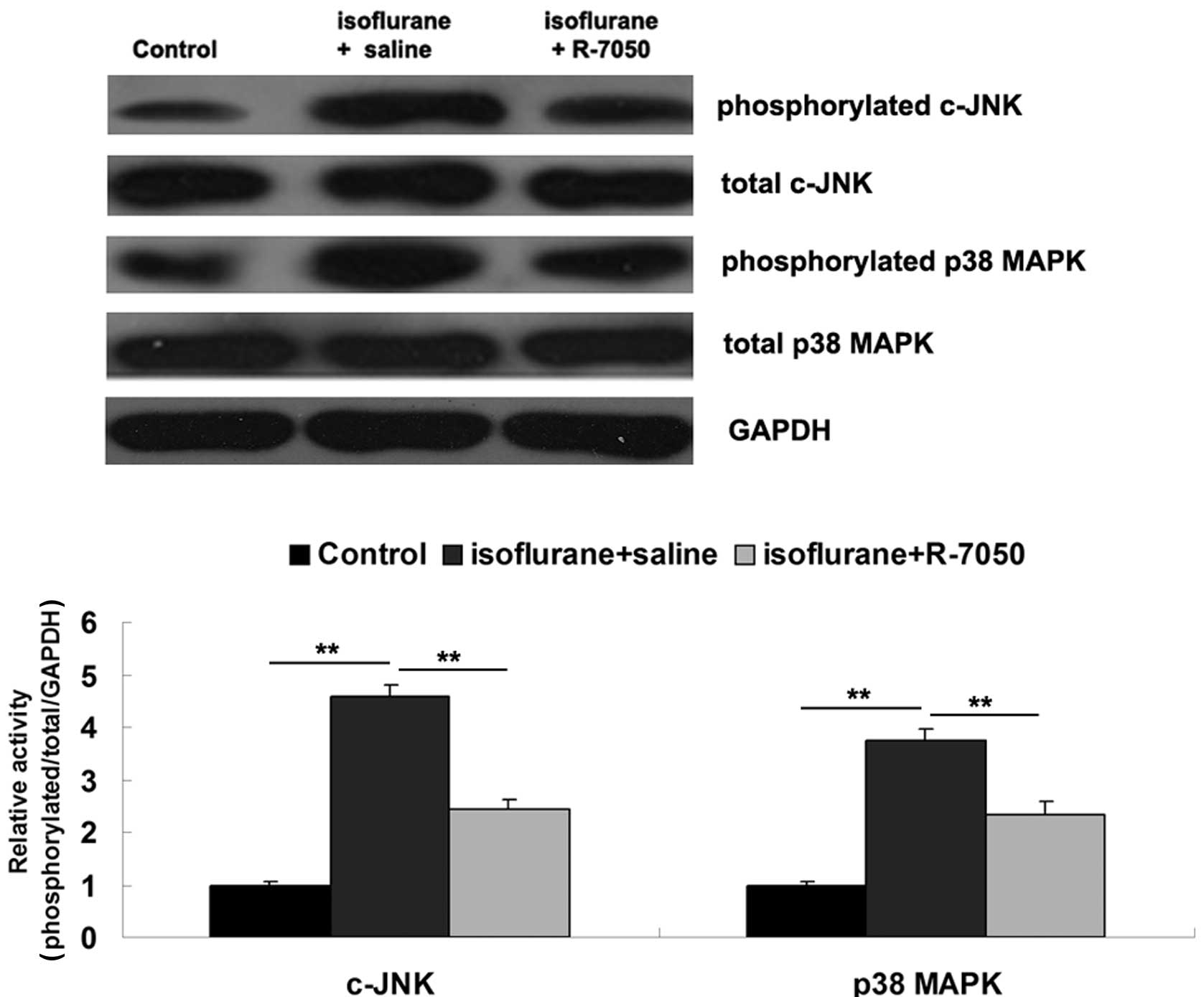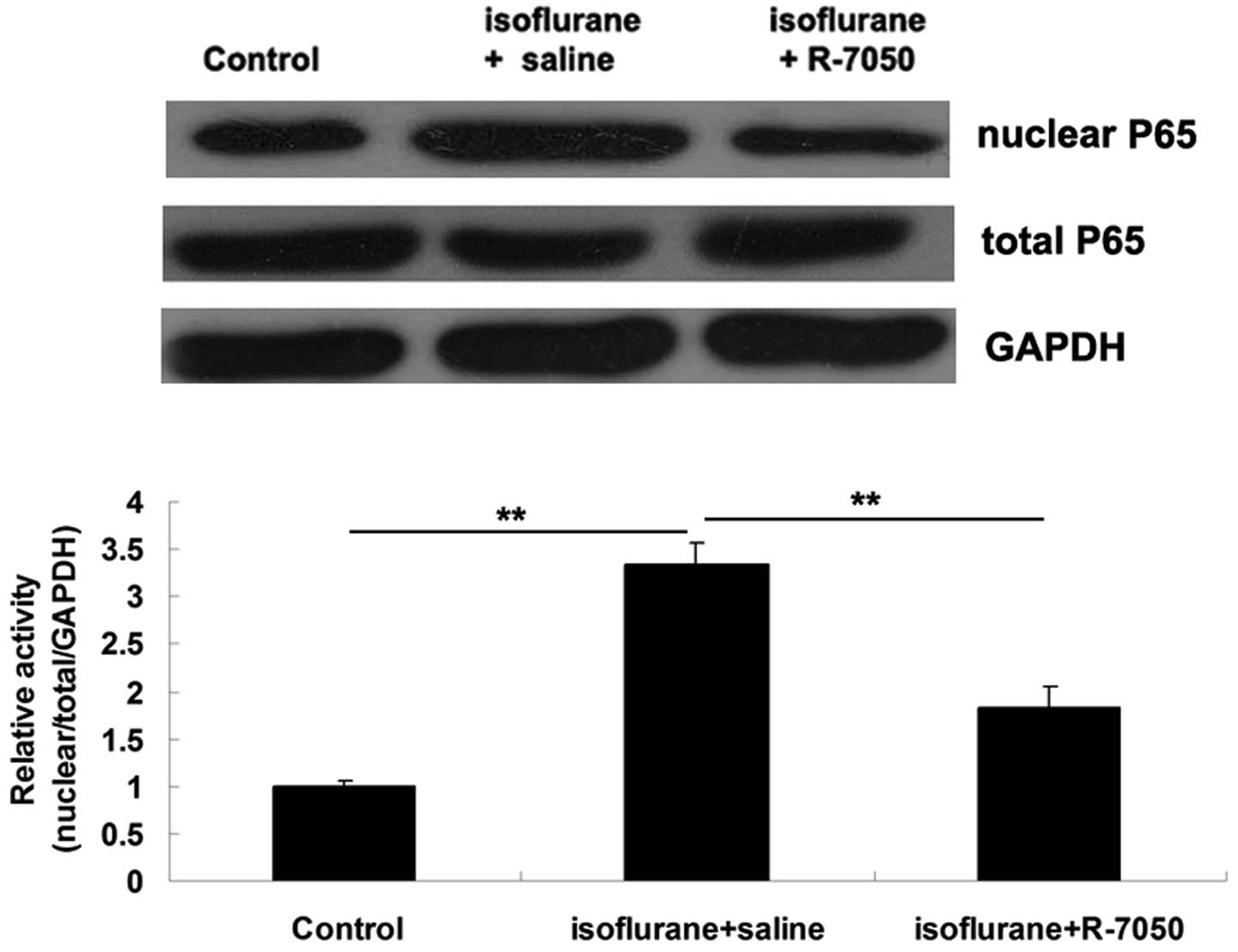|
1
|
Bekker AY and Weeks EJ: Cognitive function
after anaesthesia in the elderly. Best Pract Res Clin Anaesthesiol.
17:259–272. 2003. View Article : Google Scholar : PubMed/NCBI
|
|
2
|
Deiner S and Silverstein JH: Postoperative
delirium and cognitive dysfunction. Br J Anaesth 103 Suppl.
1:i41–46. 2009. View Article : Google Scholar
|
|
3
|
Kalenka A, Gross B, Maurer MH, Thierse HJ
and Feldmann RE Jr: Isoflurane anesthesia elicits protein pattern
changes in rat hippocampus. J Neurosurg Anesthesiol. 22:144–154.
2010. View Article : Google Scholar : PubMed/NCBI
|
|
4
|
Postoperative cognitive dysfunction in
elderly patients. Anesteziol Reanimatol. 13–19. 2012.PubMed/NCBI
|
|
5
|
Lin D and Zuo Z: Isoflurane induces
hippocampal cell injury and cognitive impairments in adult rats.
Neuropharmacology. 61:1354–1359. 2011. View Article : Google Scholar : PubMed/NCBI
|
|
6
|
Yan H, Xu T, Zhao H, Lee KC, Wang HY and
Zhang Y: Isoflurane increases neuronal cell death vulnerability by
downregulating miR-214. PLoS One. 8:e552762013. View Article : Google Scholar : PubMed/NCBI
|
|
7
|
Wang H, Xu Z, Feng C, Wang Y, Jia X, Wu A
and Yue Y: Changes of learning and memory in aged rats after
isoflurane inhalational anaesthesia correlated with hippocampal
acetylcholine level. Ann Fr Anesth Reanim. 31:e61–e66. 2012.
View Article : Google Scholar : PubMed/NCBI
|
|
8
|
Cortez M, Carmo LS, Rogero MM, Borelli P
and Fock RA: A high-fat diet increases IL-1, IL-6, and TNF-α
production by increasing NF-κB and attenuating PPAR-γ expression in
bone marrow mesenchymal stem cells. Inflammation. 36:379–386. 2013.
View Article : Google Scholar : PubMed/NCBI
|
|
9
|
Jin L, Wessely O, Marcusson EG, Ivan C,
Calin GA and Alahari SK: Pro-oncogenic factors miR-23b and miR-27b
are regulated by Her2/Neu, EGF, and TNF-α in breast cancer. Cancer
Res. 73:2884–2896. 2013. View Article : Google Scholar : PubMed/NCBI
|
|
10
|
Riches DW, Chan ED and Winston BW:
TNF-alpha-induced regulation and signalling in macrophages.
Immunobiology. 195:477–490. 1996. View Article : Google Scholar : PubMed/NCBI
|
|
11
|
Yang C, Zhu B, Ding J and Wang ZG:
Isoflurane anesthesia aggravates cognitive impairment in
streptozotocin-induced diabetic rats. Int J Clin Exp Med.
7:903–910. 2014.PubMed/NCBI
|
|
12
|
Song HY, Regnier CH, Kirschning CJ,
Goeddel DV and Rothe M: Tumor necrosis factor (TNF)-mediated kinase
cascades: Bifurcation of nuclear factor-kappaB and c-jun N-terminal
kinase (JNK/SAPK) pathways at TNF receptor-associated factor 2.
Proc Natl Acad Sci USA. 94:9792–9796. 1997. View Article : Google Scholar : PubMed/NCBI
|
|
13
|
Cao XZ, Ma H, Wang JK, Liu F, Wu BY, Tian
AY, Wang LL and Tan WF: Postoperative cognitive deficits and
neuroinflammation in the hippocampus triggered by surgical trauma
are exacerbated in aged rats. Prog Neuropsychopharmacol Biol
Psychiatry. 34:1426–1432. 2010. View Article : Google Scholar : PubMed/NCBI
|
|
14
|
Callaway JK, Jones NC, Royse AG and Royse
CF: Memory impairment in rats after desflurane anesthesia is age
and dose dependent. J Alzheimers Dis. 44:995–1005. 2014.
|
|
15
|
Liu J, Wang P, Zhang X, Zhang W and Gu G:
Effects of different concentration and duration time of isoflurane
on acute and long-term neurocognitve function of young adult
C57BL/6 mouse. Int J Clin Exp Pathol. 7:5828–5836. 2014.PubMed/NCBI
|
|
16
|
Zhang F, Zhu ZQ, Liu DX, Zhang C, Gong QH
and Zhu YH: Emulsified isoflurane anesthesia decreases
brain-derived neurotrophic factor expression and induces cognitive
dysfunction in adult rats. Exp Ther Med. 8:471–477. 2014.PubMed/NCBI
|
|
17
|
Yang B, Liang G, Khojasteh S, Wu Z, Yang
W, Joseph D and Wei H: Comparison of neurodegeneration and
cognitive impairment in neonatal mice exposed to propofol or
isoflurane. PLoS One. 9:e991712014. View Article : Google Scholar : PubMed/NCBI
|
|
18
|
Yu L, Sun L and Chen S: Protective effect
of senegenin on splenectomy-induced postoperative cognitive
dysfunction in elderly rats. Exp Ther Med. 7:821–826.
2014.PubMed/NCBI
|
|
19
|
Johnson T, Monk T, Rasmussen LS,
Abildstrom H, Houx P, Korttila K, Kuipers HM, Hanning CD, Siersma
VD, Kristensen D, et al: Postoperative cognitive dysfunction in
middle-aged patients. Anesthesiology. 96:1351–1357. 2002.
View Article : Google Scholar : PubMed/NCBI
|
|
20
|
Dong X, Luo M, Huang G, Zhang J, Tong F,
Cheng Y, Cai Q, Dong J, Wu G and Cheng J: Relationship between
irradiation-induced neuro-inflammatory environments and impaired
cognitive function in the developing brain of mice. Int J Radiat
Biol. 91:224–239. 2015. View Article : Google Scholar : PubMed/NCBI
|
|
21
|
Zeng KW, Zhang T, Fu H, Liu GX and Wang
XM: Schisandrin B exerts anti-neuroinflammatory activity by
inhibiting the Toll-like receptor 4-dependent MyD88/IKK/NF-kappaB
signaling pathway in lipopolysaccharide-induced microglia. Eur J
Pharmacol. 692:29–37. 2012. View Article : Google Scholar : PubMed/NCBI
|
|
22
|
Li XM, Zhou MT, Wang XM, Ji MH, Zhou ZQ
and Yang JJ: Resveratrol pretreatment attenuates the
isoflurane-induced cognitive impairment through its
anti-inflammation and -apoptosis actions in aged mice. J Mol
Neurosci. 52:286–293. 2014. View Article : Google Scholar : PubMed/NCBI
|
|
23
|
Zhang L, Zhang J, Yang L, Dong Y, Zhang Y
and Xie Z: Isoflurane and sevoflurane increase interleukin-6 levels
through the nuclear factor-kappa B pathway in neuroglioma cells. Br
J Anaesth. 110(Suppl 1): i82–i91. 2013. View Article : Google Scholar : PubMed/NCBI
|
|
24
|
Chen WL, Sheu JR, Hsiao CJ, Hsiao SH,
Chung CL and Hsiao G: Histone deacetylase inhibitor impairs
plasminogen activator inhibitor-1 expression via inhibiting
TNF-α-activated MAPK/AP-1 signaling cascade. Biomed Res Int.
2014:2310122014. View Article : Google Scholar : PubMed/NCBI
|
|
25
|
Kassardjian A and Kreydiyyeh SI: JNK
modulates the effect of caspases and NF-kappaB in the
TNF-alpha-induced down-regulation of Na+/K+ATPase in HepG2 cells. J
Cell Physiol. 216:615–620. 2008. View Article : Google Scholar : PubMed/NCBI
|
|
26
|
Kassardjian A and Kreydiyyeh SI: JNK
modulates the effect of caspases and NF-kappaB in the
TNF-alpha-induced down-regulation of Na+/K+ATPase in HepG2 cells. J
Cell Physiol. 216:615–620. 2008. View Article : Google Scholar : PubMed/NCBI
|
|
27
|
Ramia N and Kreydiyyeh SI: TNF-alpha
reduces the Na+/K+ ATPase activity in LLC-PK1 cells by activating
caspases and JNK and inhibiting NF-kappaB. Cell Biol Int.
34:607–613. 2010. View Article : Google Scholar : PubMed/NCBI
|
|
28
|
Gudes S, Barkai O, Caspi Y, Katz B, Lev S
and Binshtok AM: The role of slow and persistent TTX-resistant
sodium currents in acute tumor necrosis factor-α-mediated increase
in nociceptors excitability. J Neurophysiol. 113:601–619. 2015.
View Article : Google Scholar : PubMed/NCBI
|
|
29
|
Urbano PC, Soccol VT and Azevedo VF:
Apoptosis and the FLIP and NF-kappa B proteins as pharmacodynamic
criteria for biosimilar TNF-alpha antagonists. Biologics.
8:211–220. 2014.PubMed/NCBI
|
|
30
|
Li W, Wang C, Peng J, Liang J, Jin Y, Liu
Q, Meng Q, Liu K and Sun H: Naringin inhibits TNF-α induced
oxidative stress and inflammatory response in HUVECs via Nox4/NF-κ
B and PI3 K/Akt pathways. Curr Pharm Biotechnol. 15:1173–1182.
2014. View Article : Google Scholar : PubMed/NCBI
|
|
31
|
Zhu J, Jiang L, Liu Y, Qian W, Liu J, Zhou
J, Gao R, Xiao H and Wang J: MAPK and NF-κB Pathways Are Involved
in Bisphenol A-Induced TNF-α and IL-6 Production in BV2 Microglial
Cells. Inflammation. 38:637–648. 2015. View Article : Google Scholar : PubMed/NCBI
|



















